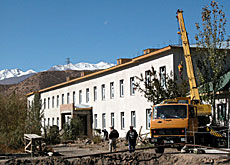
Rebuilding Kyrgyzstan’s health care system

Swiss aid is helping to rebuild hospitals and medical services in the remote and rugged mountains of Naryn Oblast, in eastern Kyrgyzstan.
The region is home to more than 240,000 people, spread across a barren high-altitude landscape the size of Switzerland.
Poverty and the harsh climate have burdened the population with illnesses such as brucellosis, altitude-induced hypertension and lung diseases including asthma.
Tobias Schüth, a project manager for the Swiss Red Cross (SRC) in Kyrgyzstan, told swissinfo that the collapse of the Soviet Union had left the country’s health system in ruins.
“The Soviet health system was pretty good, but it was inefficient in that it cost too much money,” Schüth said.
Once subsidies from Moscow ended after independence in 1991, the government was forced to slash spending on health.
Doctors’ wages plummeted, supplies of live-saving drugs dried up and hospitals fell into disrepair.
At the same time, the infant mortality rate – which had previously matched Western standards – rose to over five per cent. Poverty-linked diseases such as tuberculosis began to re-emerge.
Going local
In an effort to reverse the decline, the SRC started rebuilding four hospitals in eastern Kyrgyzstan, and supplying them with basic medical equipment.
The aid organisation is also helping the Kyrgyz government restructure its healthcare system.
At the time of independence in 1991, Kyrgyzstan had a relatively sophisticated network of well-trained medical specialists and nurses, along with an extensive hospital network.
However, Schüth says the system was overly centralised, and suffered from a lack of family doctors.
Currently, the SRC is helping local health authorities build a grassroots system, based on 27 village medical centres, staffed by general practitioners.
“One of the ways to make the system more efficient is to retrain specialised doctors as family doctors, and build up the number of family doctors coming through the universities.”
Independence
Anara Omurzakova, who heads the health service in Kyrgyzstan’s Jumgal region, says the new system gives local communities greater say over healthcare decisions.
“During the past three years people have realised that we can do everything ourselves,” Omurzakova told swissinfo.
Rather than waiting for instructions from the central government, people in Jumgal help determine their own healthcare priorities and budgets.
“Now we have a real sense of freedom that we are our own masters,” Omurzakova said.
The new SRC-funded hospitals – which are being properly insulated – will also help Omurzakova save on her hospital’s heating and electricity costs.
Health insurance
In a country where the gross national income per capita is $290 (SFr382), funding health care remains a huge challenge.
Omurzakova says Kyrgyzstan introduced a health insurance scheme in 1996, which covers 70 per cent of families in her district.
“They pay up to two per cent of family income, but if they have many children, the state pays,” she said.
The money helps pay the wages of doctors and nurses, but she admits that lack of money is her biggest challenge.
“Certainly our major problems are not of a medical nature,” she said.
And with doctors earning the equivalent of $25 per month – considered a “good wage” in Jumgal – Omurzakova says she struggles to attract young practitioners to the remote region.
swissinfo, Jacob Greber and Philippe Kropf in Jumgal
The Swiss Red Cross, funded by the Swiss government, is helping rebuild four hospitals in Kyrgyzstan’s eastern Naryn Oblast (administrative region).
The region is the size of Switzerland and is home to some 240,000 people.
The SRC is helping establish a grassroots health care system, involving 27 village medical services.
It is also supporting the further training of more family doctors in Kyrgyzstan’s medical schools.
A doctor in Naryn Oblast earns around $25 per month (SFr33).
Nurses earn between $17 and $20 per month.

In compliance with the JTI standards
More: SWI swissinfo.ch certified by the Journalism Trust Initiative





























You can find an overview of ongoing debates with our journalists here . Please join us!
If you want to start a conversation about a topic raised in this article or want to report factual errors, email us at english@swissinfo.ch.